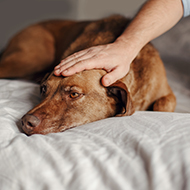
Signs include increased attention-seeking and sleeping more.
Researchers in Italy have found that dogs exhibit human grief-like behaviours when another dog in the household dies.
Writing in the Nature journal Scientific Reports, Dr Federica Pirrone of the University of Milan describes how they analysed the responses of 426 adults who had completed an online 'Mourning Dog Questionnaire'.
All of the respondents had owned at least two dogs, of which one had died, and the other was still alive.
Their findings suggest that the surviving dog changes both in terms of activities and emotions that occurred as a result of the quality of the relationship between the two animals.
In the study, 67 per cent of respondents said they noticed increased attention-seeking in the surviving dog, while another 75 per cent said their dog played less. Reduced activity levels, sleeping more and eating less were also highlighted as common behaviours. Fearfulness increased in around 35 per cent of the surviving dogs.
Researchers believe that the time the two dogs spent together did not affect the surviving dog. Possible explanations include that the dogs used to share behaviours, such as eating food. The team also hypothesise that dogs’ grief could be associated with the owner’s emotional response to the death.
"Owner perceptions about their dog’s reactions and emotions were not related to the memory or suffering of the event that tended to diminish over time," the authors conclude. "These findings indicate that a dog may show grief-related behavioural and emotional patterns when a close conspecific dies, with aspects of the latter possibly related to the owner’s emotional status."
Signs of grief have been widely reported in great apes, whales, dolphins, elephants and birds. In wild dogs, however, reactions to a deceased canine companion have been rarely observed.
Researchers say the understanding of behavioural patterns after loss in animals can be helpful in recognising their emotional needs. "However, even if we recognise the importance of these results, we still cannot confirm it was grief," they conclude.



 The BSAVA has opened submissions for the BSAVA Clinical Research Abstracts 2026.
The BSAVA has opened submissions for the BSAVA Clinical Research Abstracts 2026.